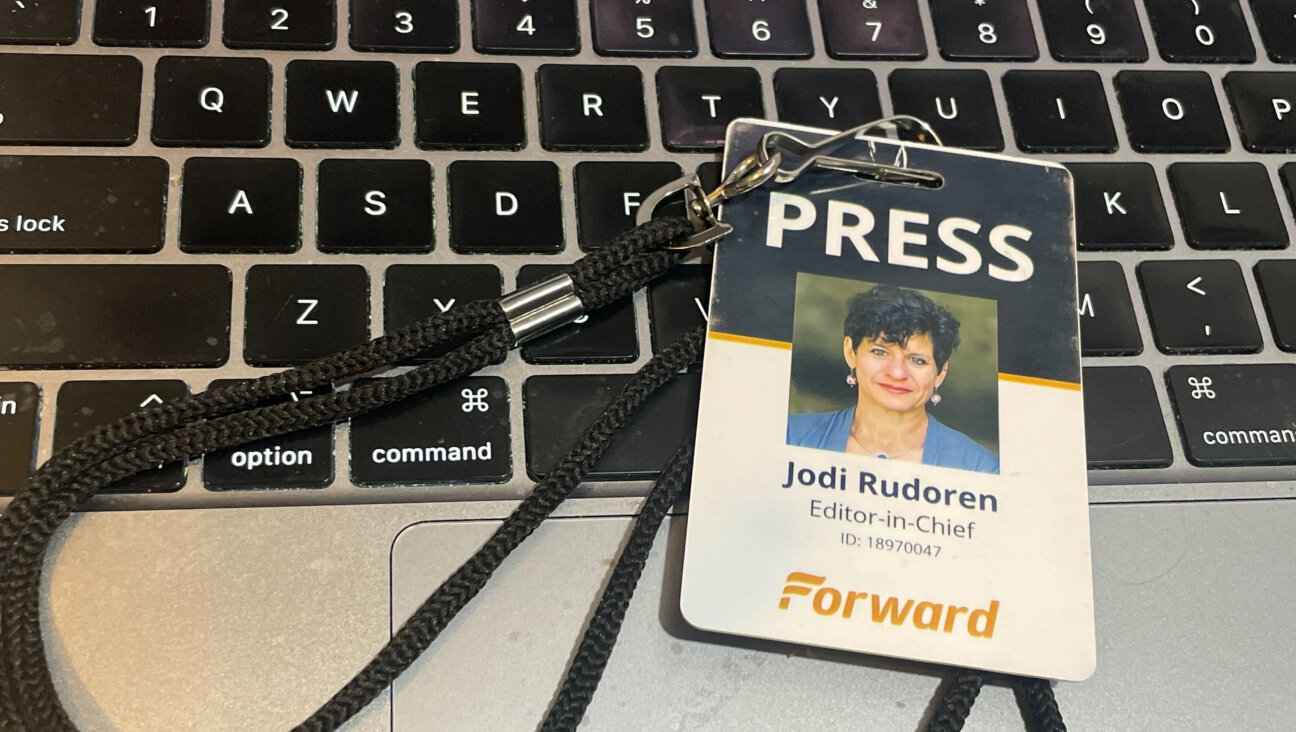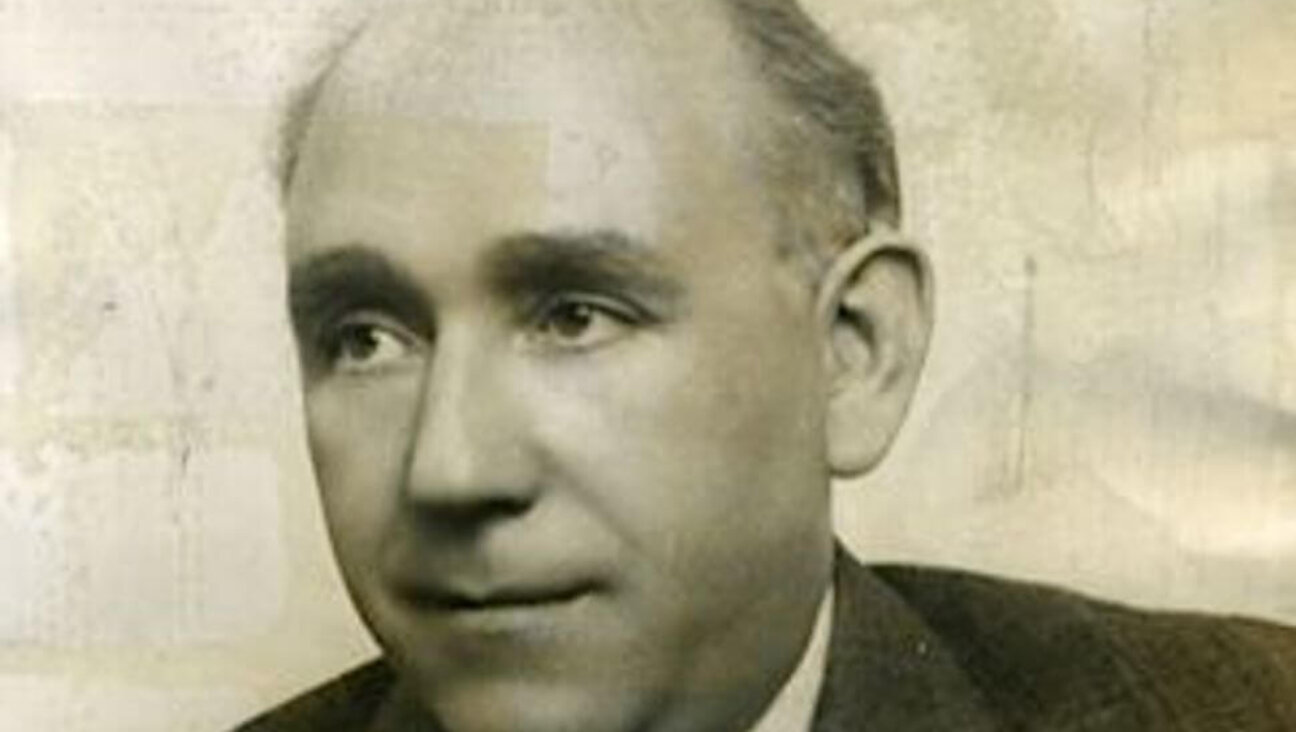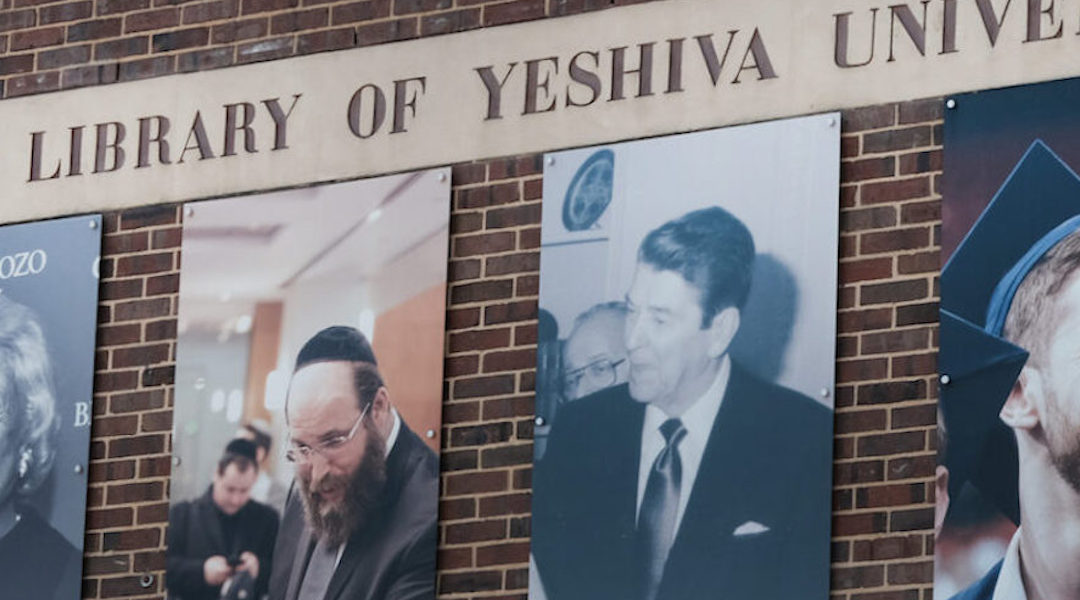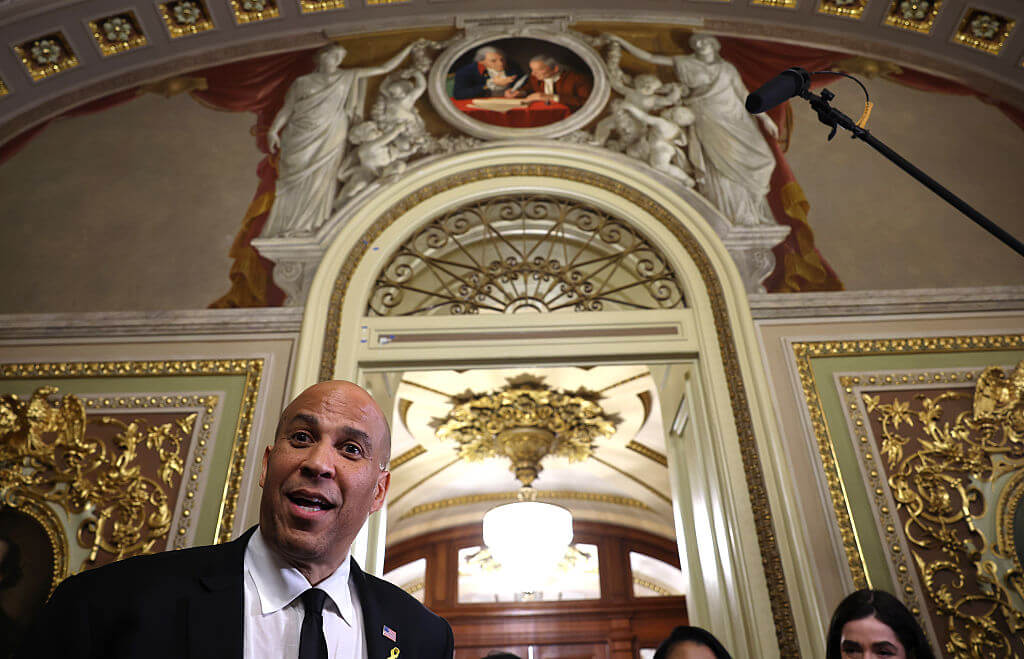The ‘Missing Males’ of Liberal Judaism

Brotherhood: Members of a Moving Traditions pilot class participate in a ?trust fall? activity held at Temple Beth Elohim in Wellesley, Mass. Image by BReTT LUBARSKy
After attending Jewish overnight camp for five summers and graduating from eighth grade at a Jewish day school, Caleb Bloomfield was ready for a break. The 18-year-old Brooklynite, now a public high school senior at The Beacon School, in Manhattan, wasn’t interested in going to his Conservative synagogue’s Hebrew high school program, or services, or youth group.

Brotherhood: Members of a Moving Traditions pilot class participate in a ?trust fall? activity held at Temple Beth Elohim in Wellesley, Mass. Image by BReTT LUBARSKy
At Jewish camp, “I felt like there was no wiggle room, that I was being told what to think,” he said. He identifies as “culturally Jewish” and isn’t interested in any of the Jewish activities in his community.
Bloomfield is, in this respect, a typical Jewish guy: Although there is a significant drop in Jewish engagement among all teenagers after their bar and bat mitzvahs, it occurs mainly with males, and in the non-Orthodox world.
Jewish programs training the next generation of Jewish leaders are seeing the impact. According to a new study by the not-for-profit organization Moving Traditions, “Engaging Jewish Teenage Boys: A Call to Action,” of the 15 interns enrolled in Hillel’s Tzedek advocacy program six years ago, there were no young men. The following year, just two of the 14 interns were men. That same program year, 2005–06, the organization Avodah: The Jewish Service Corps enrolled nearly six times as many young women as it did men. And the Reform movement’s Hebrew Union College-Jewish Institute of Religion has seen a steady decline in the rates of young men applying to become rabbis.
In May 2006, HUC-JIR’s Los Angeles campus ordained 14 new rabbis. Only four were men, and of the 20 new rabbis ordained at its New York campus, just seven were men. With some fluctuation, the paucity of men has remained among the New York campus’s ordinees. In 2009, 43 rabbis were ordained there. Just 13 of them were men. In 2010, of the 44 new rabbis, 16 were men.
Moving Traditions is based in the Philadelphia area and devoted to issues of gender and Judaism. It is perhaps best known for its program for Jewish girls, “Rosh Hodesh: It’s a Girl Thing!” which currently runs at more than 300 sites around the country and has enrolled some 8,000 middle and high school girls since its founding in 2002.
In 2007, Moving Traditions turned its attention to the problem of “missing males” in liberal Judaism and began researching teenage boys’ educational, spiritual and social needs. The organization ran pilot programs and more than 40 focus groups, composed of boys from around the country and their parents. Much of the nearly $500,000 spent on the effort was provided by the Charles and Lynn Schusterman Family Foundation.
In its report, which it released November 1, Moving Traditions outlines a new approach that its leaders hope will influence Jewish boys to view adolescence as a time when Jewish ideas, values and programs have something to offer them.
“This is a tremendous opportunity for the Jewish community because it enables us to meet the boys’ needs. In any business, you want to find out what your customer wants, and this is what they want,” said Deborah Meyer, Moving Traditions’ executive director.
The report advocates creating gender-separate spaces for teenage boys, preparing a larger cadre of male educators as role models and guides for the adolescents, and implementing programs based on a curriculum developed by Moving Traditions and called “The Brotherhood.”
Their focus is on boys from non-Orthodox backgrounds because in the Orthodox world, religious leadership is almost exclusively male and the sex-segregated nature of religious life already allows for the male-only spaces that the organization is advocating.
Jake Lewis is a 14-year-old ninth-grader at Tappan Zee High School in New York. Last spring he participated in one of Moving Tradition’s pilot programs, at Rockland County’s Orangetown Jewish Center.
Though he had been part of the Hebrew high school at the Conservative synagogue, Lewis jumped at the chance to hang out with his guy friends in the male-only weekly group, which they called “Achi —My Brother.”
Led by the synagogue’s then rabbinic intern, Jesse Olitzky, the boys ate together and discussed friendship and behavior, God and spirituality, their fears and what it means to be a man today. Each evening, they took a break to play basketball or dodgeball.
Moving Traditions hopes to expand the program to 15 other sites next fall, Meyer said, and to establish a training institute for future group leaders.
The boys loved being in Achi -— My Brother, Lewis said. Olitzky “was awesome and would always joke around with us, and wouldn’t frown on what we were saying. He let us talk to each other, not just us back to him. It would just kind of flow. It was different than my daily life. In school there aren’t that many chances to have that open discussion.”
Jewish women and girls have been carving out separate spiritual spaces since the 1970s, in prayer groups, Seders and Rosh Hodesh groups. Boys need their own space, as well, Olitzky said.
“Some of the things we discussed they would have been hesitant to share if there were girls in the room, even their best friends,” said the 26-year-old, now in his last year of rabbinical school at the Jewish Theological Seminary.
“I am a true, proud egalitarian Jew. At the same time, the more women-only programming we have, there’s fear that it impacts involvement of men,” Olitzky said.
Though it was only a pilot program, the boys want to get Achi — My Brother running again in 2011.
“I didn’t really think I would be so into it, but it’s a place to get away from everything,” said Lewis, who often came straight to Achi — My Brother from after-school baseball practice. “It was just so worth our while.”
Even Bloomfield, when he heard a brief description of Moving Traditions’ approach, remarked, “That sounds cool.”
“At day school there was such a focus on female discovery of spiritual self rather than a focus of male discovery of self. I felt as though I was neglected in terms of being able to grow spiritually,” said Bloomfield, whose former day school continues to run a “Rosh Hodesh: It’s a Girl Thing!” group.
“The girls had these meetings, and we were just left in the dust,” Bloomfield said. “It’s important that men can discover themselves spiritually and personally. That’s why this group does catch my eye.”
Debra Nussbaum Cohen is author of “Celebrating Your New Jewish Daughter: Creating Jewish Ways to Welcome Baby Girls Into the Covenant” (Jewish Lights).
The Forward is free to read, but it isn’t free to produce

I hope you appreciated this article. Before you go, I’d like to ask you to please support the Forward.
At a time when other newsrooms are closing or cutting back, the Forward has removed its paywall and invested additional resources to report on the ground from Israel and around the U.S. on the impact of the war, rising antisemitism and polarized discourse.
Readers like you make it all possible. We’ve started our Passover Fundraising Drive, and we need 1,800 readers like you to step up to support the Forward by April 21. Members of the Forward board are even matching the first 1,000 gifts, up to $70,000.
This is a great time to support independent Jewish journalism, because every dollar goes twice as far.
— Rachel Fishman Feddersen, Publisher and CEO
2X match on all Passover gifts!
Most Popular
In Case You Missed It
-

Fast Forward He called a Nazi sympathizer ‘extraordinary.’ Now he’s a nominee for U.S. attorney.
-

Opinion This is my last column as editor of the Forward
-

Books Unwieldy, unnerving, and a masterpiece — the last great Yiddish novel has arrived
-

Fast Forward Texas bakery reportedly becomes first bagel shop to be named James Beard Award finalist
-
Shop the Forward Store
100% of profits support our journalism
Republish This Story
Please read before republishing
We’re happy to make this story available to republish for free, unless it originated with JTA, Haaretz or another publication (as indicated on the article) and as long as you follow our guidelines.
You must comply with the following:
- Credit the Forward
- Retain our pixel
- Preserve our canonical link in Google search
- Add a noindex tag in Google search
See our full guidelines for more information, and this guide for detail about canonical URLs.
To republish, copy the HTML by clicking on the yellow button to the right; it includes our tracking pixel, all paragraph styles and hyperlinks, the author byline and credit to the Forward. It does not include images; to avoid copyright violations, you must add them manually, following our guidelines. Please email us at [email protected], subject line “republish,” with any questions or to let us know what stories you’re picking up.




















